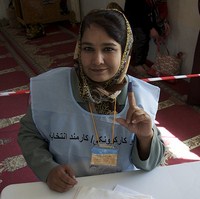On Saturday, Afghans will go to the polls in the first round of an election that, if all goes well, will result in the first democratic transfer of presidential power in Afghanistan’s history. While the country has held two presidential and two parliamentary elections since the U.S. invasion in 2001, Saturday’s will be the first of the post-Taliban era to be secured entirely by Afghan forces.
The campaign period has posed a major test for the Afghan National Security Forces, which formally assumed responsibility for Afghanistan’s security from international troops last summer. The Taliban have targeted poll workers, candidates and election officials across the country and stepped up attacks in the capital. On Wednesday, six police officers were killed in a suicide attack on the Interior Ministry in Kabul, and a provincial council candidate who had been abducted in Sar-i-Pul province was killed.
But for all the historic gravity of the event, in some respects Saturday’s election does not represent much of a break with Afghanistan’s past. The field of eight presidential candidates with two running mates apiece is full of familiar faces. The three presidential hopefuls who lead the available public opinion polls have each served in President Hamid Karzai’s cabinet at some point in the past 13 years. Their running mates include some of the same strongmen who rose to local prominence as commanders in the Soviet war that began more than four decades ago.

